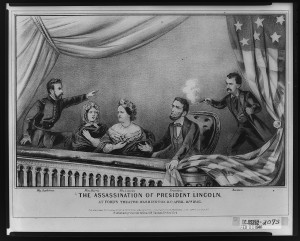 Evolution of the Secret Service
Evolution of the Secret Service
Editors Note: Most of our understanding of Secret Service work comes from Hollywood. Few of us have ever met a Secret Service Agent, or maybe you have and don’t know it. “Inside the Secret Service-A Former Agent’s Stories” is about life as a Secret Service agent. Our contributor is still a Federal Agent but with a different agency, therefore we have chosen not to reveal his name. These are stories of real life experiences from a Concord resident who spent several years as a Secret Service agent. This is his story….
When Diablo Gazette first approached me about submitting some stories about my time as a Special Agent with the U.S. Secret Service, I was a little hesitant because much of the job deals with matters of national security which are often top secret or classified in nature. In other words, “I could tell you, but then I’d have to kill you.” (Okay, not really. But it’s such a great line from Top Gun that I just had to throw it in.) But, obviously not all aspects of the job fit into a “don’t ask, don’t tell bubble.”
I spent over 11 years with the Secret Service. As I reflected back on my time in the Service I realized there were actually some pretty cool things that I got to see and do on the job. But, for the purpose of clarification and debunking common misconceptions about the Secret Service, I think it is important to give a brief history of the agency and its responsibilities.
A misconception that many outside the U.S. government have is that the Secret Service is part of the FBI or the CIA. It is neither. Since 2003, the Secret Service has been part of the Department of Homeland Security (DHS). This happened when DHS was created after the 9/11 attacks. Prior to this, the Secret Service was part of the Department of the Treasury.
The_assassination_of_President_Lincoln_at_Ford’s_Theatre
 Now here’s a bit of historical irony that you can impress (or bore) your family with around the dinner table tonight: President Lincoln’s last official act as President was signing legislation authorizing the creation of the Secret Service. The date was April 14, 1865. Later that evening, he and Mrs. Lincoln attended the play Our American Cousin at Fords theatre, just blocks from the White House. At approximately 10:15 p.m., John Wilkes Booth entered the private box where the First Family was seated and fired a single .44 caliber bullet into the back of President Lincoln’s head. The assassin’s bullet would claim the life of the nation’s 16th president at 7:22 the following morning. Although he had just authorized the creation of the Secret Service, President Lincoln had no Secret Service protection that night. It wasn’t until July 5, 1865, that the Service officially came into being after approval by Congress. But, the Secret Service wasn’t created to protect the president. That assignment wouldn’t come for another 36 years.
Now here’s a bit of historical irony that you can impress (or bore) your family with around the dinner table tonight: President Lincoln’s last official act as President was signing legislation authorizing the creation of the Secret Service. The date was April 14, 1865. Later that evening, he and Mrs. Lincoln attended the play Our American Cousin at Fords theatre, just blocks from the White House. At approximately 10:15 p.m., John Wilkes Booth entered the private box where the First Family was seated and fired a single .44 caliber bullet into the back of President Lincoln’s head. The assassin’s bullet would claim the life of the nation’s 16th president at 7:22 the following morning. Although he had just authorized the creation of the Secret Service, President Lincoln had no Secret Service protection that night. It wasn’t until July 5, 1865, that the Service officially came into being after approval by Congress. But, the Secret Service wasn’t created to protect the president. That assignment wouldn’t come for another 36 years.
During the time of the Civil War, it was estimated that between 1/3 and 1/2 of all currency in circulation in the United States was counterfeit. As a result, the Secret Service was created to combat the production and passing of counterfeited U.S. currency. It wasn’t until the assassination of President McKinley in 1901 that Congress mandated that the Service protect the President of the United States. In 1968, after the assassination of democratic presidential candidate, Senator Robert Kennedy, the Secret Service’s protection responsibilities were expanded to include the protection of major presidential candidates. Today the Secret Service is responsible for the protection of the president and vice president, their spouses and children, former presidents and spouses (for life), major presidential and vice presidential candidates and their spouses, foreign heads of state/heads of government and their spouses (when on American soil), and the planning, coordination and implementation of security operations at national major events within the U.S. such as the Super Bowl and the Olympic Games.
Although the Secret Service is no longer under the Department of the Treasury, it still continues to investigate the counterfeiting of U.S. currency as well as other financial crimes against the government to include bank fraud, access device fraud, illicit financing operations, identity theft, and network intrusions. Also, as a result of the Patriot Act, the Secret Service established and maintains Electronic Crimes Task Forces throughout the United States and internationally. They are responsible for the investigation of electronic crimes, focusing on potential terrorist attacks against critical infrastructure and financial payment systems.

Even though the Secret Service has a dual mission (protection and investigations), it is protection that most people think of when they think of the Secret Service. For me it was by far the most interesting and unique aspect of the job and the sole reason I became a Special Agent with the Secret Service. Agents, like anybody else in our society, have their own individual political views, opinions, and party affiliations. However, on the job, agents are ‘A’ political. Politics do not and understandably cannot play any role nor have any bearing on the execution of an agent’s duties.
Protection operations are extremely detailed, time consuming, at times tense, and often require days and even weeks away from home. There’s a saying that is heard often in the Secret Service, “Sometimes the bear gets you; sometimes you get the bear”, meaning that some assignments are boring (i.e. standing post all night in a hotel hallway for hours on end) or miserable (standing post in a suit in the snow or rain for hours on end) or are overly strenuous and don’t go as planned. For example, a protectee may change his/her schedule at the last minute, rendering days or even weeks-worth of Secret Service advance work, null and void. When protectees change plans at the last minute or in mid-stream, agents must scramble to set up entirely new operations plans, resulting in agents getting little to no sleep sometimes for several days on end. This can also result in being away from home much longer than originally scheduled. These are examples of the bear getting you.
But, there are also times where agents come out ahead (and get the bear). An example of this would be when a foreign dignitary is coming into the United States. Let’s say the dignitary’s first touchdown on American soil is in Hawaii. This becomes the point where Secret Service protection of the dignitary begins and will continue for the duration of his U.S. visit. Agents are scheduled and fly out to Hawaii prior to the scheduled arrival. Once in Hawaii, they learn that the foreign dignitary has postponed the trip for 3 days for some reason. Nobody cares or complains about the schedule change in this scenario because the agents just got three days paid vacation in Hawaii complements of the US Government. In all honesty, I would be stretching it a bit (quite a bit) if I said this happens very often. Nine times out of 10, the bear gets you.
However, the sense of duty, unity, and camaraderie, shared by the agents is extremely strong; a brotherhood, a second family. Agents know the importance of their mission and the potential catastrophic outcome if things go wrong. Agents are prepared to deal with changing situations, schedules, and environments. It’s just part of the job. But in spite of the pressure, long hours, and time away from home, most of us thrived on the challenges. Being a Special Agent in the U.S. Secret Service was a fascinating job that I would have paid the government to do. I absolutely loved it and it was an incredible time in my life. It sounds shallow, but outside of my family and close friends, the Secret Service was the most important thing in my life.
Agents are frequently asked about the personal side of those whom we protect; their personalities, demeanor, what do they discuss when not in the public eye, are they friendly, etc. Although not classified information, a protectee’s personal life is just that; personal. I would never discuss, nor would any other agent worth his or her salt, and certainly not in a public forum, anything that shed a bad light on any Secret Service protectee’s personal life. However, there were several incidents over the years that I witnessed, and others that were told to me by fellow agents who had experienced them, that reveal the true colors and human side of protectees when the cameras were off and no press was present. During these moments they weren’t politicians, they were just regular people, who, after spending the vast majority of their waking hours in a fishbowl for all to observe and critique, were now off the clock. The human side could be refreshing to see.
In future issues of The Diablo Gazette, I’ll share with you some of the experiences that made this job so memorable for me: next month – my first protectee assignment, Former First Lady Barbara Bush.
If you have questions you would like to ask the agent, please send them to info@ diablogazette.com. Select questions will be answered in a Q and A format in future editions.

